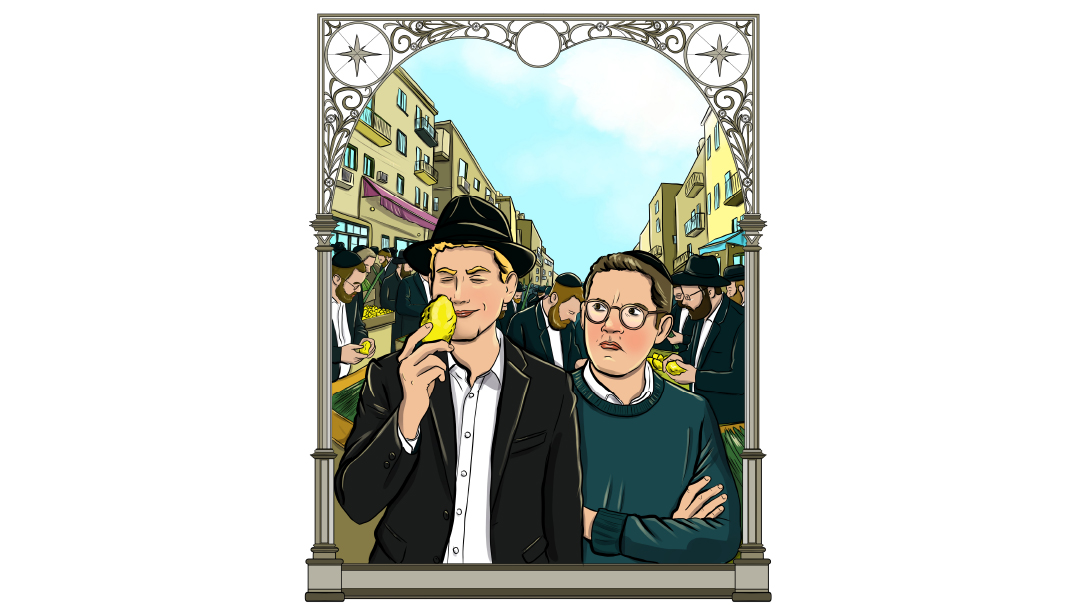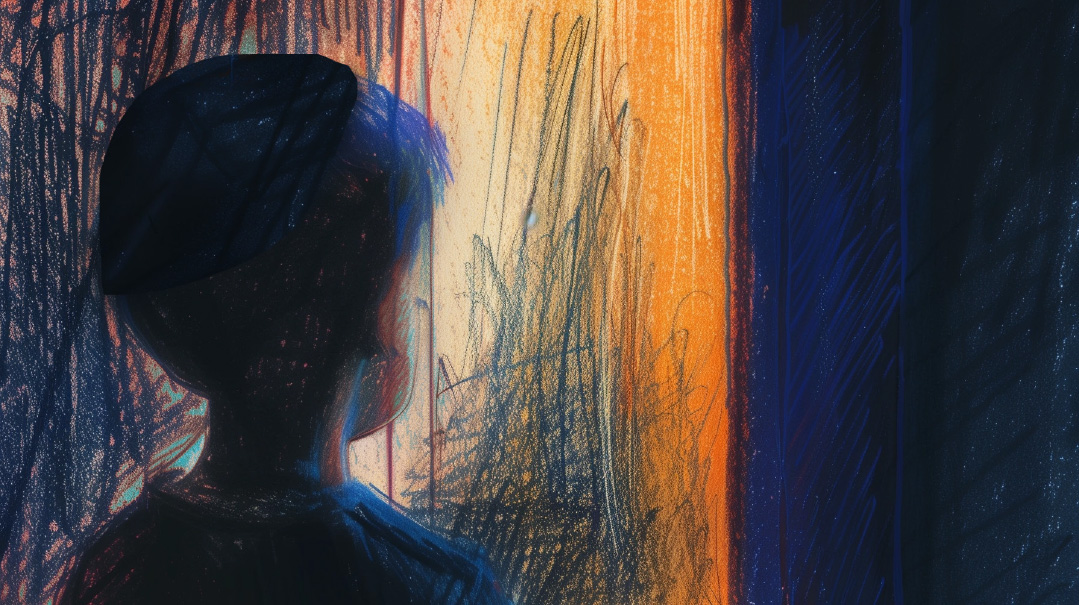A Tzniyusdig Proposal
| February 26, 2020
The goodbye is always the most awkward part, especially if you know it’s a goodbye and never plan on seeing you again. You have to somehow convey in one polite-but-not-too-inviting smile that you’re a decent person with good manners, and so you’re thanking him for spending his time and money taking you out, but at the same time, you want to make it quite clear what answer he can expect from the shadchan the moment you walk through your door.
Unfortunately, in my decade of dating, I’ve had lots of opportunities to perfect that goodbye.
I walk inside, kick off my heels, and encounter my mother’s cautiously hopeful face.
“No,” I say firmly. And then, to ward off her protests, “Absolutely no.”
My mother lets out her breath, and slumps onto the couch. “What was wrong? Mrs. Scheiner had such nice things to say about him. She said he was smart and funny and idealistic, just like you want.”
I grit my teeth. “I said ‘idealistic’ — not loony. The guy couldn’t stop talking about climate change and fossil fuels and all the tree-hugging protests he’s been to.”
My mother stares at me for a moment. “Well, that certainly sounds idealistic.”
“He saved my straw wrapper for his compost pile.” I’m already dialing the shadchan’s number. “Do you want to tell Mrs. Scheiner or should I?”
My mother wearily reaches for the phone. Smart move. The state I’m in, I might say something that would make her refuse to set me up ever again.
I see my mother clutching the phone as she heads to another room. I can just picture the conversation.
“So, nu, she’ll get used to recycling, it’s not that hard. All Dafna needs is to be open-minded. And to have a sense of humor, of course. I’m forever telling her that, to get through shidduchim, you need to bring along your sense of humor.”
I flop down on the couch pillow. I do have a sense of humor, and Mrs. Scheiner is absolutely right, because without it I'd never have survived ten years of this. I don’t know where I’d be right now if I hadn’t been able to laugh the time I was asked by a shadchan for not just my dress size, but also my shoe size and ring size (“his mother has a thing with skinny fingers”). Or the time the boy’s parents requested a graphology sample. Or when one mother sent a cartoonist to my house, because she wanted to see how I looked in caricature.
Now my mother walks back into the room and announces, “Mrs. Scheiner said to remind you that you need to keep your sense of humor in these situations.”
I sit up on the couch. “Go tell her to spend two hours being lectured to about biodegradable plastics, and then see how fast her sense of humor runs away,” I snarl. I stand up and head wearily for the stairs. After all this time, why am I still letting myself get worked up over this annoying, degrading process?
I close my bedroom door behind me and walk over to my full-length mirror. Here I am, wearing my first-date outfit, makeup flawless. I cross my eyes and stick my tongue out. “I HAVE A SENSE OF HUMOR!” I feel like shouting. Instead, I rearrange my features into the twisted, silent scream of that guy in the Edvard Munch painting. Existential crisis, here I come.
Then I laugh, as my anger slowly drains. I’m already picturing how I’ll call my sister Miri tomorrow and describe to her how Benny abruptly stopped in the middle of a scary story about putting a glass bottle inside the regular garbage and chasing the garbage truck halfway across the city, as he suddenly noticed my fur-trimmed poncho. “That’s not real, is it?”
I plop onto my bed, open a magazine, then put it back down. I can’t focus. “You need to keep your sense of humor in these situations,” I repeat in a high-pitched, nasal voice. Hah.
I close my eyes, then immediately open them. I slowly pick up the magazine again. A pure genius idea has just popped into my head.
Dear Editor,
As someone who is greatly concerned about the large number of older singles in our community, as well as the other serious problems afflicting Klal Yisrael, I’d like to suggest a modest proposal to alleviate the crisis.
Let’s call it “A Tzniyusdig Proposal.”
No one reading the letters’ section of any frum magazine can deny that everyone today has tzaros. What can we do to bring brachah to this generation? For anyone familiar with the Torah sources, the answer is obvious.
As we all know, tzniyus is the biggest source of blessing, as it says, “Blessing does not rest except upon that which is hidden from the eye.” But when it comes to working on tzniyus today, we are missing the boat. We hear mussar shmuessen about tzniyus in dress and tzniyus in spending, but it’s absolutely shocking to me that there’s one area of tzniyus that’s been neglected by nearly everyone. Allow me to have the zechus of reviving this meis mitzvah and bringing to the attention of the tzibbur the serious tzniyus breach that occurs when one is funny.
Rabbosai, what is a joke if not the very antithesis of tzniyus? When you crack a one-liner, you are creating the opening for pritzus to claw its way through! Picture the shaking and howling that accompany a belly laugh (even the very name evokes an image to shudder at!) and you will surely understand why Solemn Ones throughout the generations frowned upon smiles. How can it be that our shuls and schools and batei medrash are filled with jokes and full-throated laughter?!
And should the reader protest, “But most people’s jokes aren’t even funny,” I reply, do the halachos of tzniyus apply only to the young and beautiful? Would you dare be motzaei la’az on the holy Jewish sense of humor?
Therefore, let all yirei Shamayim take it upon themselves to be nizhar in this area and return to the sacred conduct of our Bubbies and Zeides in the shtetl — of whom it could justly be said that in all the photos existing from the alte heim, you will never find the hint of a smile.
Once we eradicate all laughter, jokes, and lightheartedness from our lives, maybe we can at last begin to approach our communal problems with the seriousness they deserve. Maybe next time we meet an older single, a parent of an off-the-derech kid, a neighbor whose credit cards are so maxed out he can’t keep up with your borrowed-money wedding, or any other communal nebach, instead of flashing him a jaunty smile, you will greet him with a compassionate solemnity that will help him feel the weightiness of his lot.
In this zechus, may the pipes of Heaven shower forth an abundance of serious Yiddishe brachah and nachas.
With holy trembling,
Rabbi Yekusiel Phimfilheimer
With a final smirk at my satiric talents, I send this off to the email address listed at the bottom of the Letters to the Editor page. And then I go to sleep with a smile on my face.
I don’t hear back from the magazine, so I have no idea what the editorial staff think of my letter until the following Thursday. After peeling off the plastic packaging, I open the fresh magazine and let out a whoop. There it is, in black and white, my very own debut as a social commentator.
Hah! I can’t wait for the reactions, to hear people discussing the brilliantly funny satire and wondering who could possibly be behind it. Luckily, I’m meeting with some friends tonight. I amuse myself during work wondering if they’d ever guess it’s me and whether I should reveal the truth.
When I arrive at The Coffee Corner, Shani and Malka are already sitting at a table. I slide into the seat across from them. “Hi guys, I’m SO glad to see you.” I grab a menu as I continue to chatter. “Oh my gosh, do I have a crazy story to tell you about my date last week. Would you believe he started a leaflet campaign in his yeshivah against eating animal products?”
Shani looks up slowly and raises her eyebrows without even cracking a smile, while Malka says a subdued “Oh?”
I falter. Did I say something wrong? Nonplussed by the stony reception, I mumble, “On second thought, let’s order first,” and open my menu.
We chat lightly about our jobs, and when the food comes, I try again. “Anyway, so that date I was telling you about, it was wacky. He actually hung up signs in his yeshivah of cows saying, ‘Please don’t put me in your cholent.’ He showed one to me. Mr. Popularity, huh?” I laugh.
It takes me a second to realize I’m the only one laughing. Shani’s nodding with polite interest as if I’d told her it’s going to rain tomorrow, and Malka is squirming uncomfortably, a napkin over her mouth, as she looks down at her plate.
Okay, this is weird. “Um, guys? Is something wrong?”
Malka shoots Shani a look and then says, “No, not at all. Only, Shani and I were talking before you came, and we kind of… well, we were saying—”
Shani cuts in. “We’ve decided to take on a new kabbalah in the zechus of finding a shidduch.”
My eyes widen. “Oh. Wow. That’s very, um,” uncharacteristic “—admirable.” I fold my napkin. “Maybe I should join in this shemiras halashon campaign, too?”
They exchange another look. Malka gives a little giggle, then quickly clamps her napkin back over her mouth.
“No, this isn’t a shemiras halashon kabbalah,” she says.
“Phew, because if I can’t laugh with you about my crazy dates, then —”
“Yeah, that’s it,” Shani says quickly. “No laughing.”
I drop my napkin. “Excuse me?”
Her face is shining. “You haven’t heard about this? It’s a thing, being makpid in tzniyus in laughter. It’s supposed to be an amazing segulah for getting married.”
I look at her, my mouth suddenly dry. “I’ve never heard of such a segulah.”
“No? It’s been around forever; it’s brought down in all the seforim hakedoshim.”
“Yeah? So, when did you first hear about it?” I stare her down, until she admits, “Uh, today. I read about it in Mishpacha. Someone wrote in… Here, take a look.” And she pulls out of her purse a carefully folded copy of my letter.
I pretend to read it, but inside, I’m feeling seriously unsettled.
“Um, guys? Hate to burst your bubble, but don’t you think this is… well, a joke?”
Malka’s eyes widen in shock, and Shani angrily snatches the paper out of my hands.
“How could you say that about a letter written by a respected rabbi?”
This is getting weirder and weirder. “Come on, Rabbi Yekusiel Phimfilheimer? Don’t you think that’s a made-up name?”
Shani tosses her head. “I don’t know why you’d say that. And look at the Torah sources he brings. Just because you’re not makpid on laughing—”
“What in the world is untzniyus about laughing?” I burst out.
Malka ventures, “Well, this Rabbi writes about the brachah being found in what which is hidden, and when you laugh, you expose your teeth.”
“What about when you talk?”
She blinks, and then, brightening, says, “Oh, but here you’re also exposing your gums.”
I lean forward in my chair. “Exposing your gums? Malka Handelman, please tell me you're joking.”
“Chas v’shalom!” she gasps.
Forty Days of No Laughter!
Read how one woman saw unbelievable yeshuos.
Call now to be a part of the zechus! A minyan of yeshivah bochurim will refrain from cracking spontaneous jokes for a full month. For your donation of $180 or more, they will also refrain from participating in a Purim shpiel.
“My jokes elicit more groans than laughs — if the laughs are batel b’shishim, am I allowed to keep saying them?”
This and other contemporary sh’eilos on our Ask the Rabbi program!
The world has gone crazy. That’s the only possible explanation for the way my ridiculous “proposal” has suddenly taken off. Everyone and her cousin are walking around like they’re at a funeral. I’m starting to get depressed. Is there no one else in the world who gets satire when they see it?
When the next week’s Mishpacha comes, I rip it open, scouring the letters in the hope that someone, somewhere, will have called out my letter for the spoof that it was.
But no. It’s all about praise for Rabbi Phimfilheimer for bringing our attention to such a serious matter. With a groan, I turn the pages until I reach my dependable back page—
Nooo! I stare, hardly able to process what I’m seeing. Right there, where the Kichels usually hold forth, I see in plain gray letters: The Sliced Breads. There’s a picture of the family sitting around the Shabbos table, and Yechiel is saying, “Kinderlach, the most important thing in life is to be kind to others and kind to yourself. Right, Nechama?”
Nechama beams from across the table, “Right as always, Yechiel. Tell the children the story of how you helped that old man.”
“Tatty, how are you meishiv the stira between being nice to others and being nice to yourself?” Nachi cuts in, “For example, the other week, Baruch didn’t want to—”
“Now, now, Nachi,” Yechiel chides, “no lashon hara.”
“Tatty, you’re such a tzaddik,” Chaviva gushes.
Yechiel and Nechama respond together, “And you, our kinderlach, are all tzaddikim.”
My mouth hangs open in dumbfounded horror. If even the Kichels has succumbed, then there’s no hope at all.
Maybe I’m the crazy one.
“Dafna, here’s your dress, back from the cleaners.” My mother walks into my room, where I’m still sitting in shock over the magazine, and she lets out an exasperated breath. “You do remember that you have a date in two hours, right?”
I stand up and stretch. “Yeah, I’m getting ready.”
She watches me for a moment and shakes her head. “I hope you at least pretend to be excited when you’re on the date.”
I yawn. “Don’t worry, I’ll be my usual charming self.”
My mother frowns. She’s been frowning a lot lately. In fact, her entire range of expression has now become limited to sad, angry, or anxious.
Come to think of it, that about sums up most of the people I’ve been coming in contact with.
I’m true to my word tonight. Akiva Fried is about as full of personality as a potato, and, honestly, less cheerful, but I try to make up for his gloominess by being extra bubbly.
“So then, just as we’re sneaking in through the window our friends left unlocked, someone taps our backs, and we scream as we turn around and see — the eim bayis!” I can’t believe I’m unpacking the same old seminary stories I used to pull out for a laugh ten years ago, but tonight I’m desperate.
This guy is totally non-responsive. No, not true, he’s frowning now, even deeper than my mother, and I’ve been on this circuit long enough to know what that means—
“It’s a no,” I announce, as soon as I walk through the door and do the ceremonial kicking off of the heels.
“What was wrong this time?” My mother looks like she’s about to cry.
“Hey, don’t look at me, I tried my hardest, while his idea of conversation were a few sad stories about losing his new Gemara and his goldfish dying when he was seven. And yet, mark my words, we’ll be getting a phone call any second from Mrs. Scheiner with a no.”
Just at that moment, the phone rings. The timing is so perfect, you’d think this was a fiction story or something.
“Hello, Mrs. Scheiner…” My mother listens, glances at me, listens some more. “Mm hmm, I see. Yes, I understand…. Okay, I’ll tell her.”
She hangs up. “You were right.”
“I told you.” Somehow, being right doesn’t take away the sting of rejection. Even though I would’ve said no, too, had I been given the chance.
My mother leans against the wall of the living room. “She says the boy feels you weren’t frum enough for him.”
“What?” I sputter. “What in the world gave him that impression?”
My mother continues. “She said to remind you that when you’re in shidduchim, you always need to bring along your se—”
“I did bring along my sense of humor.” I grit my teeth.
My mother shakes her head. “No, your sefer Tehillim. It always looks good to pull it out of your purse when there’s a lull in the conversation.”
“Whaaat?!”
She turns to go upstairs. Pausing, she throws over her shoulder, “It was your jokes. He said a girl who jokes on a date isn’t the type of girl he wants to marry.”
I’ve entered an alternate universe. A universe where it’s perfectly normal to act like you’re in mourning when you meet a friend on the street. A universe where you walk into a store to do your Purim shopping and see all the Simchas Purim stickers from years past changed to Kedushas Purim.
I’m going out of my mind. How can it be that nobody was perceptive enough to understand that my letter was a satire? Have we lost all sense of subtlety in our superficial generation?
I sigh as I sit down at my laptop once more. If a piece of satire echoes in a forest and nobody laughs, what does that make the satire?
What does it make the writer?
Feeling like a world-class fool, I open a fresh document and write my second-ever letter to the editor.
Dear Editor,
A couple of weeks ago, you were kind enough to print my letter titled A Tzniyusdik Proposal.
As lovers of humor will surely have caught, the letter was a satire. It was never meant to be taken at face value. There are no Torah sources for the idea that having a sense of humor is a lack of tzniyus, or that refraining to laugh will bring brachah v’yeshuah.
I was merely trying to express the fact that we should show greater sensitivity toward people going through difficult times.
I apologize for any misunderstandings.
Signed,
My name isn’t
Rabbi Yekusiel Phimfilheimer
What a sad day for higher-level reading comprehension everywhere the day my letter of retraction is published. Still, I look forward to having humor back in my world and eagerly anticipate the reaction this time around.
When the editorial desk forwards me an e-mailed reaction to my letter, I click it open immediately — then gape at the words.
Dear Editor,
Can you kindly pass on this message to the letter writer who’s calling himself Rabbi Yekusiel Phimfilheimer?
Dear Sir:
As a person actually bearing the name Rabbi Yekusiel Phimfilheimer, I do not appreciate your appropriating my name in the public domain. Especially when it is being used to spew nonsense. Kindly desist immediately from all further activity using this moniker.
Thank you.
Rabbi Y.P.
I have never been as flabbergasted as I am reading these words. There is actually someone named Rabbi Yekusiel Phimfilheimer in this world? But how could that be? Who could actually have such a name? And how in the world could I have stumbled on it?
I begin to pace my bedroom and try to take stock of this insane situation.
When Shani and Malki insisted there could be such a rabbi, well, gosh, they were actually right! Could it be that I had once, somewhere, heard of such a person, and the name had stuck in my head…
I stop my pacing abruptly, as an even more terrible thought occurs. Could it be possible — as utterly crazy as the thought may be — that my entire epistle was actually based on fact? On some heard-long-ago Torah thought that had lodged deep in my unconscious and emerged in the dead of night?
The thought was too frightening to contemplate.
Heading to my laptop, I decided there was only one thing to do. I’d have to come clean. I’d send this rabbi an email apologizing for unwittingly sullying his name.
Dear Rabbi Phimfilheimer,
Thank you for contacting me. I never imagined I was choosing a real person’s name when I wrote my letter which was, as I hope you realize, intended to be a satire. (But was it? Was it??)
I'm a single woman who was merely trying to express her frustration with the shidduch system and the way everyone patronizingly tells us to “keep our sense of humor” as we’re dragged through one degrading experience after another.
I sincerely apologize for any harm I may have caused to your reputation.
I don’t hear back from the rabbi, which I hope is a good sign, though I’m not quite sure. I also don’t see an influx of responses to my second letter, which I’m afraid isn’t a very promising sign. Over the next few days, I walk around in a haze of anxiety and self-doubt, which those closest to me can’t help but notice.
“You’ve taken on the kabbalah, too?” Malka asks, when we meet for coffee later that week.
I blink. “Uh, no,” I say automatically, and then wonder if maybe I have. The thought makes me even more depressed.
“How’s it been going by you?” I ask.
“Well,” she says cheerfully as she sips her latte, “I stopped after day 12. I’m not cut out for these 40-day things, I guess.” She laughs, and the sound is like a musical symphony to my ears. “Shani’s still going,” she adds. “She insists she’ll be engaged by the end of it. We’ll see.” She shrugs. “Honestly, what’s the good of being engaged if you can’t even laugh about it with your friends?”
By the time I leave, I’m in a lighter mood than I’ve been all week. When I get home, my mother is on the phone, and there’s the oddest expression on her face. If I didn’t know better, if I hadn’t heard her declare for the past three weeks that she was taking on the laughing kabbalah in my zechus, I’d say she was trying hard to suppress a smile.
She gets off the phone and her eyes are twinkling. “Sit down, Dafna,” she says. “That was Mrs. Scheiner with a shidduch suggestion.”
I clench my teeth. “Who is it this time?”
“Well,” she says, and now her lips are positively inching upwards. “He’s a good, serious bochur but with a real sense of humor — in her words, ‘like your Dafna.’ And, get this, he called her to ask about you. Apparently, he heard that you do a bit of dabbling in, um, writing letters to magazines?” Here my mother shoots me an inquisitive look. I squirm.
“How did he know?” I ask.
“Wait, you haven’t asked me his name. It’s Yehuda Penn — but he says you might know him as Yekusiel Phimfilheimer.”
I fall off my chair.
Okay, I don’t, but I should. I'm an idiot. A world-class idiot who fell for her own stupid bait. I open and close my mouth a few times, not knowing what to say, wondering how in the world I can face this clever guy who caught me at my own game.
And then my mother can’t help herself, and she starts to laugh, and then I’m laughing, too, long and hard. And suddenly, the world tilts right again.
(Originally featured in Family First, Issue 682)
Oops! We could not locate your form.












